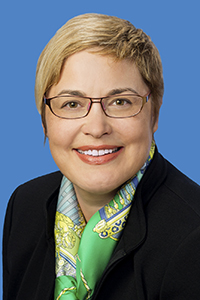SPECIAL SPONSORED CONTENT
WOMEN IN LEADERSHIP

“Make choices based on what you’re going to learn… and how that’s going to help you grow into the role you really want.”
- Adrienne Young, CFA, Vice-president, Director of Credit Research and Portfolio Manager, Franklin Templeton Canada Calgary, Alberta
You started out in the arts. What shifted your course toward the financial industry?
The flip answer is that I bore easily. I come from a liberal arts, academic family, and, like many other kids with that background, I stayed in school when I couldn’t figure out what I wanted to do for the rest of my life.
I did a BA in European history, then an MA in French literature. When I still couldn’t find a job, I went to Japan to teach English. When you go to another country where you don’t speak the language and you don’t understand the culture, everything is new and exciting. But you also get opportunities to meet people you may not have met at home, just because they speak English. I met portfolio managers who were 45 or so and their work still excited them. That made an impression on me. So, I came back, learned about being a financial analyst and got a CFA; my career progressed from there. I’ve made all my career choices based on whether it interested me, and whether there was an opportunity to learn and grow. Even now, if I go home at the end of the day saying, “I learned something,” it has been a good day.
Did you feel you had to work harder as a woman to succeed in your field?
The latest statistics point to 11% of portfolio managers in Canada being female, with female portfolio managers less likely to manage active portfolios or multiple portfolios. That would suggest it’s harder, but I’ve been lucky; that hasn’t been my experience. I feel very fortunate that the women in the generation before me worked very hard to be taken seriously as analysts and portfolio managers. Also, because I chose jobs that pleased and excited me, I put a tremendous amount of time into learning and excelling because it was fun. If it’s interesting, if it’s absorbing, if you’ve got people you look forward to learning from every day, you put in the work because it’s not work.
What’s your favourite part of your current role?
First, the people I work with. Our team is fantastic and so diverse. We have a mathematician, an accountant, a musician, a historian, an economist—people with very different points of view and skill sets. Just as our portfolios are carefully diversified, so is our team. And we make our decisions communally, and I think we make better decisions that way.
Second, and I love it almost as much, is a sense of fulfillment. I feel like what we are doing here matters. Every basis point I make goes into somebody’s retirement account. That has value to me and gives me great pleasure.
How do you keep your team motivated to excel?
Franklin Templeton (FT) has built a culture that’s focused on the long term, not only when it comes to investment decisions but also when it comes to people decisions. The attitude is, we’re going to invest in you early in your career and you’re going to stay. That’s powerful as an underpinning. Within the Calgary fixed income team, the culture is entrepreneurial, and we make it clear that you can make a difference no matter which seat you fill. If you have a good idea, we’ll take it. Everyone has a voice, everyone has an opportunity to grow, and everyone knows he or she shares responsibility for every basis point. My personal style is to make a great point of recognizing when someone does a great job or makes a great attempt. In that, I’m following in the footsteps of the managers I’ve had who I thought were great.
What advice do you give to the young women you mentor?
Ask more questions and listen carefully to the answers. Don’t be afraid to fail.
Do what excites you, because it’s going to be something that you put more time into. Don’t make career choices based on money or title—at least, not in the first 10 years of your career. Make choices based on what you’re going to learn, whom you’re going to learn from and how that’s going to help you grow into the role you really want—especially if it scares the living daylights out of you. Women tend to suffer from imposter syndrome more than men. But, if you’ve developed a great network of former bosses, mentors and colleagues who think highly of you because of the great work you’ve done, when you ask them about a great opportunity, they’re going to be champions and say, “Yes, go for it!” At some point in your career, that’s really going to matter to you.
What programs does Franklin Templeton have in place to encourage women as leaders?
Our president, Jenny Johnson, is a strong advocate for all our diversity efforts, including encouraging women as leaders within the organization—it’s important to have support from the highest levels of one’s organization. We have several employee-led diversity teams, including Women at FT. The company provides online forums and workshops where we can discuss topics such as finding a mentor, leadership stereotypes and personal branding. Thanks to FT, I belong to Women in Capital Markets, an organization that I highly recommend to anyone interested. FT also supports Girls Who Invest, an organization that provides young women in college or university the opportunity to experience the field of portfolio management—because if you’re bright, the sky is the limit. You can do almost anything. The problem is, young women must be introduced to those “anythings” to figure out what might interest them.
So the more we expose these incredibly talented young women to portfolio management, the better the chances they’ll say, “Yes, that suits me,” and stay.

